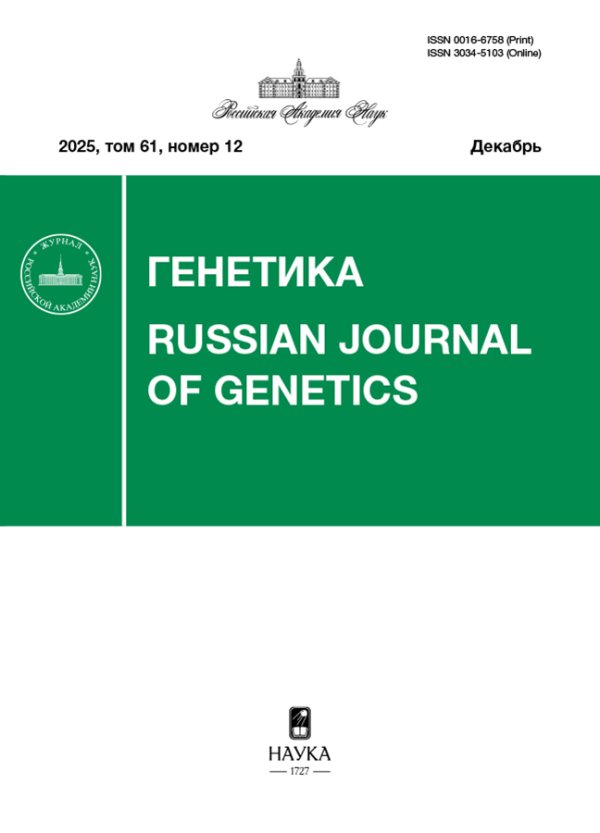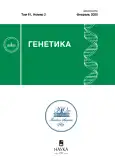Сравнительный анализ кишечных метагеномов пациентов с депрессией по сигнатурным генам Faecalibacterium prausnitzii на штаммовом уровне
- Авторы: Аверина О.В.1, Ковтун А.С.1, Даниленко В.Н.1
-
Учреждения:
- Институт общей генетики им. Н.И. Вавилова Российской академии наук
- Выпуск: Том 61, № 2 (2025)
- Страницы: 35-44
- Раздел: ГЕНЕТИКА МИКРООРГАНИЗМОВ
- URL: https://ogarev-online.ru/0016-6758/article/view/291699
- DOI: https://doi.org/10.31857/S0016675825020043
- EDN: https://elibrary.ru/uvnipj
- ID: 291699
Цитировать
Аннотация
С использованием двух различных методических подходов, биоинформатического и количественного ПЦР-анализа, был проведен сравнительный анализ кишечных метагеномов пациентов с депрессией и здоровых добровольцев по представленности сигнатурных бактериальных генов, кодирующих ключевые ферменты для продукции метаболитов, биомаркерных для депрессии, комплементарных генам из геномов комменсальной бактерии Faecalibacterium prausnitzii. С использованием in silico подхода была выявлена штаммовая специфичность этих биомаркерных генов, проведена их кластеризация на группы и исследовано распространение представителей различных групп в 36 метагеномах пациентов с депрессией и 38 здоровых добровольцев. К ряду генов из наиболее распространенных групп были подобраны праймеры, с использованием которых был проведен количественный ПЦР-анализ 15 метагеномов от пациентов с депрессией и 15 метагеномов от здоровых добровольцев. Сравнительный анализ полученных данных выявил статистически значимое снижение уровня представленности генов, кодирующих глутаматсинтазу GltB, аспарагинсинтетазу AsnA, серин-гидроксиметилтрансферазу в кишечных метагеномах пациентов с депрессией. На основе полученных данных можно рекомендовать эти гены как биомаркеры для разработки тест-систем для диагностики клинической депрессии по кишечному микробиому.
Ключевые слова
Об авторах
О. В. Аверина
Институт общей генетики им. Н.И. Вавилова Российской академии наук
Автор, ответственный за переписку.
Email: olgavr06@mail.ru
Россия, Москва, 119991
А. С. Ковтун
Институт общей генетики им. Н.И. Вавилова Российской академии наук
Email: olgavr06@mail.ru
Россия, Москва, 119991
В. Н. Даниленко
Институт общей генетики им. Н.И. Вавилова Российской академии наук
Email: olgavr06@mail.ru
Россия, Москва, 119991
Список литературы
- Dantzer R., O’Connor J.C., Freund G.G. et al. From inflammation to sickness and depression: When the immune system subjugates the brain // Nat. Rev. Neurosci. 2008. V. 9. № 1. P. 46–56. https://doi.org/10.1038/nrn2297
- Bachmann S. Epidemiology of suicide and the psychiatric perspective // Int. J. Environ. Res. Public Health. 2018. V. 15. № 7. https://doi.org/10.3390/ijerph15071425
- Meyyappan A.C., Forth E., Wallace C.J.K. et al. Effect of fecal microbiota transplant on symptoms of psychiatric disorders: a systematic review // BMC Psychiatry. 2020. V. 20. № 1. e299. https://doi.org/10.1186/s12888-020-02654-5
- Аверина О.В., Даниленко В.Н. Микробиота кишечника человека: роль в становлении и функционировании нервной системы // Микробиология. 2017. Т. 86. № 1. С. 1–19. https://doi.org/10.7868/S0026365617010050
- Averina O.V., Zorkina Y.A., Yunes R.A. et al. Bacterial metabolites of human gut microbiota correlating with depression // Int. J. Mol. Sci. 2020. V. 21. № 23. e9234. https://doi.org/10.3390/ijms21239234
- Averina O.V., Poluektova E.U., Zorkina Y.A. et al. Diagnosis and treatment of depression // Int. J. Mol. Sci. 2024. V. 25. № 11. https://doi.org/10.3390/ijms25115782
- Kovtun A.S., Averina O.V., Angelova I.Y. et al. Alterations of the composition and neurometabolic profile of human gut microbiota in major depressive disorder // Biomedicines. 2022. V. 10. № 9. https://doi.org/10.3390/biomedicines10092162
- Hao Z., Wang W., Guo R. et al. Faecalibacterium prausnitzii (ATCC 27766) has preventive and therapeutic effects on chronic unpredictable mild stress-induced depression-like and anxiety-like behavior in rats // Psychoneuroendocrinology. 2019. V. 104. P. 132–142. https://doi.org/10.1016/j.psyneuen.2019.02.025
- Camacho C., Coulouris G., Avagyan V. et al. BLAST+: Architecture and applications // BMC Bioinform. 2009. V. 10. № 10. https://doi.org/10.1186/1471-2105-10-421
- Quinlan A.R., Hall I.M. BEDTools: A flexible suite of utilities for comparing genomic features // Bioinformatics. 2010. V. 26. № 6. P. 841–842. https://doi.org/10.1093/bioinformatics /btq033
- Wood D.E., Salzberg S.L. Kraken: Ultrafast metagenomic sequence classification using exact alignments // Genome Biol. 2014. V. 15. № 3. https://doi.org/10.1186/gb-2014-15-3-r46
- Sievers F., Wilm A., Dineen D. et al. Fast, scalable generation of high-quality protein multiple sequence alignments using Clustal Omega // Mol. Syst. Biol. 2011. V. 5. e539. https://doi.org/10.1038/msb.2011.75
- Untergasser A., Nijveen H., Rao X. et al. Primer3Plus, an enhanced web interface to Primer3 // Nucl. Acids Res. 2007. V. 35. P. W71–W74. https://doi.org/10.1093/nar/gkm306
- Cao Y., Shen J., Ran Z.H. Association between Faecalibacterium prausnitzii reduction and inflammatory bowel disease: A meta-analysis and systematic review of the literature // Gastroenter. Resear. Pract. 2014. V. 2014. https://doi.org/10.1155/2014/872725
- Fitzgerald C.B., Shkoporov A.N., Sutton T.D.S. et al. Comparative analysis of Faecalibacterium prausnitzii genomes shows a high level of genome plasticity and warrants separation into new species-level taxa // BMC Genom. 2018. V. 19. № 1. e931. https://doi.org/10.1186/s12864-018-5313-6
- De Filippis F., Pasolli E., Ercolini D. Newly explored Faecalibacterium diversity is connected to age, lifestyle, geography, and disease // Curr. Biol. 2020. V. 30. № 24. P. 4932–4943. https://doi.org/10.1016/j.cub.2020.09.063
- Lopez-Siles M., Duncan S.H., Garcia-Gil L.J. et al. Faecalibacterium prausnitzii: From microbiology to diagnostics and prognostics // ISME J. 2017. V. 11. P. 841–852.
- Lopez-Siles M., Martinez-Medina M., Suris-Valls R. et al. Changes in the abundance of Faecalibacterium prausnitzii phylogroups I and II in the intestinal mucosa of inflammatory bowel disease and patients with colorectal cancer // Inflamm. Bowel Dis. 2016. V. 22. № 1. P. 28–41. https://doi.org/10.1097/MIB.0000000000000590
- Benevides L., Burman S., Martin R. et al. New insights into the diversity of the genus Faecalibacterium // Front. Microbiol. 2017. V. 8. https://doi.org/10.3389/fmicb.2017.01790
- Bai Z., Zhang N., Jin Y. et al. Comprehensive analysis of 84 Faecalibacterium prausnitzii strains uncovers their genetic diversity, functional characteristics, and potential risks // Front. Cell. Infect. Microbiol. 2023. V. 12. https://doi.org/10.3389/fcimb.2022.919701
- Li W., Lin X., Liang H. et al. Genomic and functional diversity of the human-derived isolates of Faecalibacterium // Front. Microbiol. 2024. V. 15. https://doi.org/10.3389/ fmicb.2024.1379500
- Tanno H., Chatel J.-M., Martin R. et al. A new gene markers for classification and quantification of Faecalibacterium spp. in the human gut // FEMS Microbiol. Ecology. 2023. V. 99. № 5. https://doi.org/10.1093/femsec/fiad035
- Fu X., Lu Y., Wu J. et al. Alterations of plasma aspartic acid, glycine and asparagine levels in patients with major depressive disorder // Zhejiang Da Xue Xue Bao Yi Xue Ban 2012. V. 41. № 2. P. 132–138. Chinese. PMID: 22499508
- Pu J., Liu Y., Zhang H. et al. An integrated meta-analysis of peripheral blood metabolites and biological functions in major depressive disorder // Mol. Psychiatry. 2021. V. 26. P. 4265–4276. https://doi.org/10.1038/s41380-020-0645-4
- Yang X., Wang G., Gong X. et al. Effects of chronic stress on intestinal amino acid pathways // Physiology & Behavior. 2019. V. 204. P. 199–209. https://doi.org/ 10.1016/j.physbeh. 2019. 03.001
Дополнительные файлы










